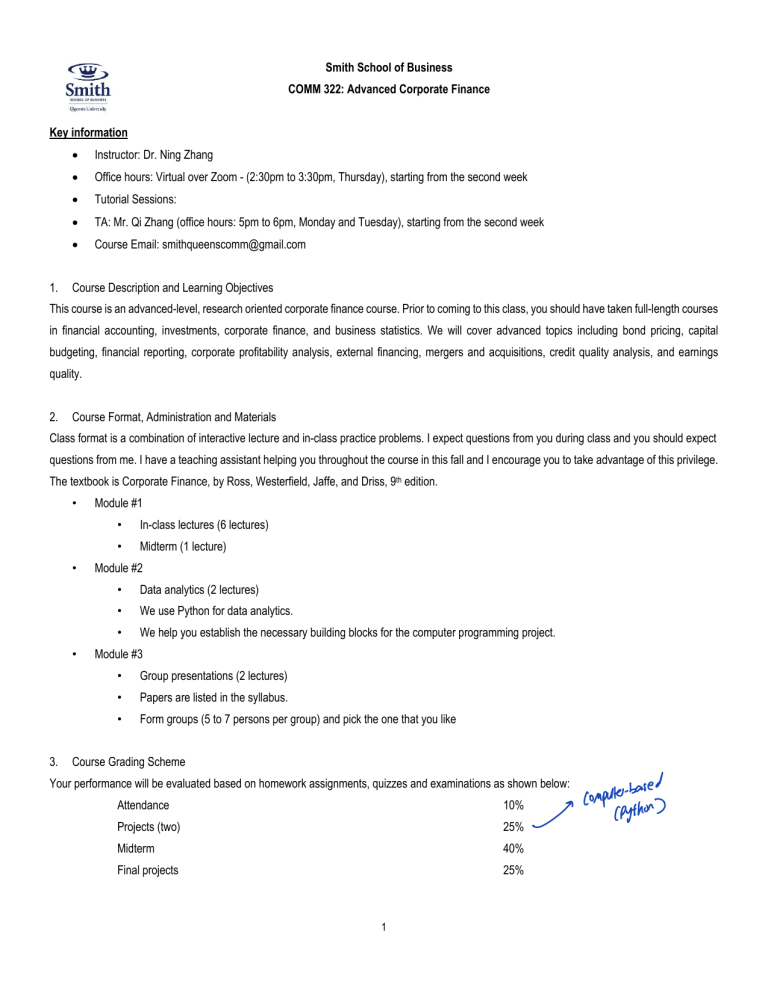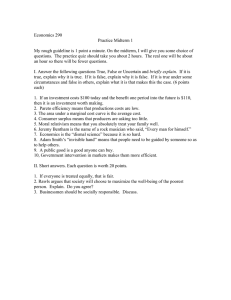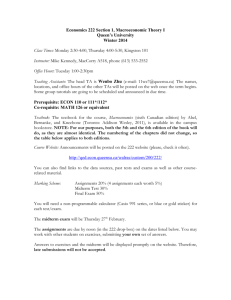
Smith School of Business COMM 322: Advanced Corporate Finance Key information 1. Instructor: Dr. Ning Zhang Office hours: Virtual over Zoom - (2:30pm to 3:30pm, Thursday), starting from the second week Tutorial Sessions: TA: Mr. Qi Zhang (office hours: 5pm to 6pm, Monday and Tuesday), starting from the second week Course Email: smithqueenscomm@gmail.com Course Description and Learning Objectives This course is an advanced-level, research oriented corporate finance course. Prior to coming to this class, you should have taken full-length courses in financial accounting, investments, corporate finance, and business statistics. We will cover advanced topics including bond pricing, capital budgeting, financial reporting, corporate profitability analysis, external financing, mergers and acquisitions, credit quality analysis, and earnings quality. 2. Course Format, Administration and Materials Class format is a combination of interactive lecture and in-class practice problems. I expect questions from you during class and you should expect questions from me. I have a teaching assistant helping you throughout the course in this fall and I encourage you to take advantage of this privilege. The textbook is Corporate Finance, by Ross, Westerfield, Jaffe, and Driss, 9th edition. • • • 3. Module #1 • In-class lectures (6 lectures) • Midterm (1 lecture) Module #2 • Data analytics (2 lectures) • We use Python for data analytics. • We help you establish the necessary building blocks for the computer programming project. Module #3 • Group presentations (2 lectures) • Papers are listed in the syllabus. • Form groups (5 to 7 persons per group) and pick the one that you like Course Grading Scheme Your performance will be evaluated based on homework assignments, quizzes and examinations as shown below: Attendance 10% Projects (two) 25% Midterm 40% Final projects 25% 1 based Computer Python Midterm: A two-hour midterm exam is scheduled after we finish Module #1. You are allowed to use a calculator for the exams. The calculator must be pre-approved by the Commerce Office. It is your responsibility to obtain a blue sticker before the exams. Exams missed without adequate prior documentation of the reason for missing the exam will result in a grade of zero. A conflict with your travel plans is not a sufficient reason. Your midterm exam will be returned to you, along with a solution. You will have one week to challenge your grade in writing. We will grade the entire exam upon your request. Final project: Your final exam takes the form of a research proposal. The proposal will be no more than 5 pages. I will provide detailed instruction along the way we proceed. 4. Academic Integrity Academic integrity is a commitment to the fundamental values of honesty, trust, fairness, respect, and responsibility. It is the responsibility of all faculty, staff, and students at Queen’s to support and uphold these fundamental values of academic integrity. I have attached a complete academic integrity statement at the end of this syllabus issued by Queen’s University. 5. Disabilities Accommodations Statement Students with physical and learning disabilities must contact the instructor as soon as possible in order for special accommodations/modifications. Queen's University is committed to achieving full accessibility for persons with disabilities. Part of this commitment includes arranging academic accommodations for students with disabilities to ensure they have an equitable opportunity to participate in all of their academic activities. If you are a student with a disability and think you may need accommodations, you are strongly encouraged to contact Queen’s Student Accessibility Services (QSAS) and register as early as possible. For more information, including important deadlines, please visit the QSAS website at: http://www.queensu.ca/studentwellness/accessibility-services/. 6. Equity, Diversity, Inclusion & Indigenization at Smith Smith School of Business is committed to cultivating a vibrant, diverse and inclusive academic and work environment rooted in a culture of mutual respect and equity such that all members of our community feel safe, possess a strong sense of belonging, and are empowered to thrive. Papers for presentation: Bova, F. (2013). Labor unions and management’s incentive to signal a negative outlook. Contemporary Accounting Research, 30(1), 14-41. Chen, Y., Goyal, A., Veeraraghavan, M., & Zolotoy, L. (2020). Media coverage and IPO pricing around the world. Journal of Financial and Quantitative Analysis, 55(5), 1515-1553. Caskey, J., & Ozel, N. B. (2017). Earnings expectations and employee safety. Journal of Accounting and Economics, 63(1), 121-141. Cronqvist, H., Makhija, A. K., & Yonker, S. E. (2012). Behavioral consistency in corporate finance: CEO personal and corporate leverage. Journal of Financial Economics, 103(1), 20-40. Graham, J. R., Li, S., & Qiu, J. (2008). Corporate misreporting and bank loan contracting. Journal of Financial Economics, 89(1), 44-61. He, J. J., & Tian, X. (2013). The dark side of analyst coverage: The case of innovation. Journal of Financial Economics, 109(3), 856-878. Heese, J., Pérez-Cavazos, G., & Peter, C. D. (2022). When the local newspaper leaves town: The effects of local newspaper closures on corporate misconduct. Journal of Financial Economics, 145(2), 445-463. Hsu, P. H., Tian, X., & Xu, Y. (2014). Financial development and innovation: Cross-country evidence. Journal of Financial Economics, 112(1), 116-135. Lin, C., Officer, M. S., & Zou, H. (2011). Directors' and officers' liability insurance and acquisition outcomes. Journal of Financial Economics, 102(3), 507-525. 2 Academic Integrity Statement ACADEMIC INTEGRITY Definition of Academic Integrity Any behavior that compromises the fundamental scholarly values of honesty, trust, fairness, respect and responsibility in the academic setting is considered a departure from academic integrity and is subject to remedies or sanctions as established by Smith School of Business and Queen's University. These behaviors may include plagiarism, use of unauthorized materials, unauthorized collaboration, facilitation, forgery and falsification among other actions. It is every student’s responsibility to become familiar with Queen’s School of Business policy regarding academic integrity and ensure that his or her actions do not depart, intentionally or unintentionally, from the standards described at: https://smith.queensu.ca/about/academic_integrity/index.php. Helpful FAQ’s about academic integrity are at: https://smith.queensu.ca/about/academic_integrity/faq.php To assist you in identifying the boundary between acceptable collaboration and a departure from academic integrity in this specific course, I provide the following guidelines for individual and group work. If my expectations still are not clear to you, ask me! The onus is on you to ensure that your actions do not violate standards of academic integrity. Individual Work Assignments and examinations identified as individual in nature must be the result of your individual effort. Outside sources must be properly cited and referenced in assignments; be careful to cite all sources, not only of direct quotations but also of ideas. Ideas, information and quotations taken from the internet must also be properly cited and referenced. Help for citing sources is available through the Queen’s University library: http://library.queensu.ca/help-services/citing-sources. Group Work I will clearly indicate when groups may consult with one another or with other experts or resources. Otherwise, in a group assignment, the group members will work together to develop an original, consultative response to the assigned topic. Group members must not look at, access or discuss any aspect of any other group’s solution (including a group from a previous year), nor allow anyone outside of the group to look at any aspect of the group’s solution. Likewise, you are prohibited from utilizing the internet or any other means to access others’ solutions to, or discussions of, the assigned material. The names of each group member must appear on the submitted assignment, and no one other than the people whose names appear on the assignment may have contributed in any way to the submitted solution. In short, the group assignments must be the work of your group, and your group only. All group members are responsible for ensuring the academic integrity of the work that the group submits. Consequences of a Breach of Academic Integrity Any student who is found to have departed from academic integrity may face a range of sanctions, from a warning, to a grade of zero on the assignment, to a recommendation to Queen's Senate that the student be required to withdraw from the University for a period of time, or even that a degree be rescinded. As an instructor, I have a responsibility to investigate any suspected breach of academic integrity. If I determine that a departure from Academic Integrity has occurred, I am required to report the departure to the Dean’s office, where a record of the departure will be filed and sent to the program office to be recorded in the student file. 3 Ning’s Zoom office hour information Month Day Zoom ID Password Sep 15 860 3608 8035 337662 Sep 22 847 3905 3159 058409 Sep 29 817 4784 9805 952449 Oct 6 870 9647 4047 777363 Oct 13 822 5691 9182 003220 Oct 27 861 0917 4561 097852 Nov 3 890 7123 3104 400067 Nov 10 899 2991 9618 279709 Nov 17 815 8443 6443 493652 Nov 24 861 4916 7865 047694 Dec 1 823 8145 5676 239722 Qi’s Zoom office hour information Reoccurring Meeting ID: 847 2341 9808 Passcode: 384772 4




